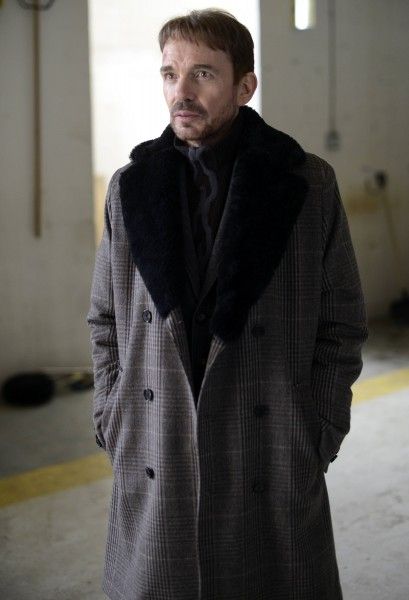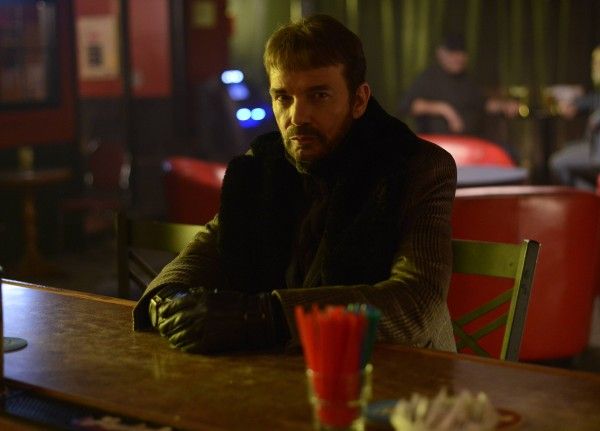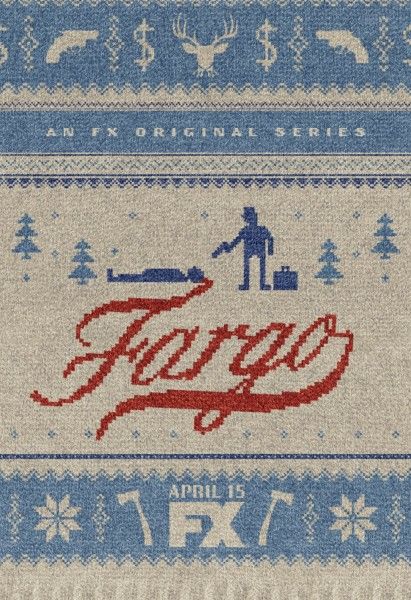Neither part of the term "original adaptation" fully applies to FX's new limited series Fargo, even if it's branded as such.It evokes a sense of the original Ethan and Joel Coen film without using the same characters, yet it's full of callbacks. There are currently many series on air that tie in with movies: NBC's Hannibal (a prequel of sorts to Silence of the Lambs), A&E's Bates Motel (a prequel to Psycho), and even NBC's comedy About a Boy (like Fargo, it is "inspired" by the world of the movie). What they have in common is that each series is at its best when its the farthest away from its source material. Once it becomes its own interpretation of the world it's using as a base, it gets stronger. With Fargo, it may take a few episodes for that to develop, but once it does, there's great potential. Hit the jump for more.
Like all series adaptations (either from books or movies), there's the divide between those who know the source material, and those who don't. Sometimes it's helpful, sometimes it's not. I almost always side on creating a distance between the original work and the television series, but in the case of Fargo, a recent viewing of the film is helpful (it's currently streaming on Netflix), because the show is stocked with many visual callbacks to the film. It also helps establish a sense of the tone, one which possibly only the Coen's can really pull off.
That's not to say that Noah Hawley (The Unusuals), who wrote and created the television series (and who got the Coens on board) won't eventually get it right. But "The Crocodile's Dilemma" shows that he's not there yet. In fact, it took reading a lot of other reviews on the series (from those who have already watched the first four episodes) to make me convinced about continuing.
Let's hit the positives first: the casting is fantastic. As the beleaguered Lester Nygaard (a reworked version of William H. Macy's Jerry Lundegaard in the film), Martin Freeman -- and his very believable American accent -- is the crux of the series so far, being the first person who Lorne Malvo (Billy Bob Thornton) is able to corrupt. Malvo (such names … so Dickensian) is a soft-spoken but dangerous drifter and hit man, with a Rust Cohle-like penchant for philosophical monologue. But he is essentially a kind of Lucifer figure, seemingly sent to tempt humanity towards evil, and cause chaos in his wake (as Rust might put it: "Darkness, yeah"). So far, he seems to be doing just what he came for; the residents of Bemidji, starting with Lester, are all too ready to take his nefarious suggestions to heart.
A few of those other (not yet tempted) residents are played by Bob Odenkirk (Breaking Bad) and Keith Carradine (Dexter), and in future episodes, will include Adam Goldberg (2 Days In Paris), Oliver Platt (X-Men: First Class), Glenn Howerton (It's Always Sunny in Philadelphia), Jordan Peele (Key & Peele) and many others. It's a fantastically deep cast, and one that portends well for the rest of the series (for instance, even in their two small scenes, Odenkirk and Carradine owned their time).
"The Crocodile's Dilemma" is full of plot and setup, almost a dizzying amount, but its main trajectory is one that seems to set up the question not of whodunnit (because, like the original film, there is not mystery here), but how and why. Unfortunately (and here is where things start to turn), the premiere's dragging pace and bleakness (accented by great use of the stark, snowy landscape) make it as slow as a Minnesota winter.
It's also disappointing that the female characters on the show are essentially reduced to simpletons and nags, like Lester's (now deceased) wife, as well as Sam Hess' widow Gina (Kate Walsh). Even the seminal role of Marge Gunderson (originally Frances McDormand), paragon of "Minnesota nice" that was portrayed in a way that kept her kind but sharply perceptive, has been cut up and spread out over several roles, from the struggling and naive Molly Solverson (Allison Tolman) to the overwhelmed and conflicted Gus Grimly (Colin Hanks). The lack of a strong female role is the antithesis of the original film, and if FX's Fargo is trying to replicate its tone, then watering down that factor is a disappointing mistake.
The other issue, when it comes to characterization (all of which are as broad as they can be), "Minnesota nice" starts coming off as backwoods slowness. Malvo, and deceased Sheriff Verne, were the only two who seemed to have any deeper thoughts. The others' simplicity is played for laughs, in a way as broad as a run-of-the-mill broadcast comedy. It's an unflattering portrayal, and one that is against the original feel of the film. There, the sincere niceness was a funny juxtaposition to the immense and visceral violence taking place.
"The Crocodile's Dilemma" was an interesting start, and it certainly shows a very expanded world for its 10-episode run. There's a lot to play with here, dramatically and morally and comedically. With only a handful of characters yet introduced, there's even more potential for the series to become a complex web of comedy and consequence. For now though, "oh jeez."
Episode Rating: C
Musings and Miscellanea:
-- Maybe it took the piling on of Lester's high school bully Sam, his brother Chaz, and his wife Pearl to show how desperate and pent-up he was that he would resort to a braining, but it was sure slathered on thick.
-- "You don't have the sense God gave a clam" - Motel manager.
-- The violence was just as messy as the Coen brothers would have done it: the shotgun wounds, the knife stabbing to the head, the slow trickle of blood from where the hammer hit. Intense!
-- "It's unsanitory" - Motel manager.
-- Martin Freeman is terrific, and even though he has the exact same mannerisms and persona in almost every role he's in, I love it anyway.
-- I'm hoping Molly turns into a stronger character, and that she's able to put the pieces together as her mentor hoped she would (not just relying on male detectives).
-- "I think he might have the autism" - Chaz, about his son Gordo, who draws on the walls and pees in mason jars. There's a lot of weirdness in Fargo used as a garnish, which is how it should be. Sometimes though (like with the brothers and with Gina) it's a little too much.
-- "Well heck!" - Lester.




